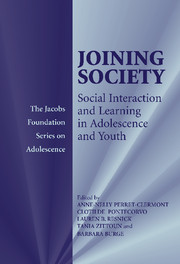Book contents
- Frontmatter
- Contents
- List of Contributors
- Foreword
- Preface
- I Introduction
- 1 Thinking Spaces of the Young
- 2 Prospects for Youth in Postindustrial Societies
- 3 Overview of the Volume
- II Youth-Constructed Socialization
- III Personal Agency Through Collective Activity
- IV Learning in Practice and Discourse
- V Intergenerational Sites for Thinking
- VI Pathways to Adulthood in National Context
- Index
3 - Overview of the Volume
Published online by Cambridge University Press: 08 January 2010
- Frontmatter
- Contents
- List of Contributors
- Foreword
- Preface
- I Introduction
- 1 Thinking Spaces of the Young
- 2 Prospects for Youth in Postindustrial Societies
- 3 Overview of the Volume
- II Youth-Constructed Socialization
- III Personal Agency Through Collective Activity
- IV Learning in Practice and Discourse
- V Intergenerational Sites for Thinking
- VI Pathways to Adulthood in National Context
- Index
Summary
The contributions of this book lead the way to a wide variety of questions related to young people moving toward adulthood in complex societies. Ideas such as youth, society, and adulthood are problematic; so is the nature of the move itself. In their opening chapters, Perret-Clermont and Resnick consider this period as a time of preparation or transition; but it can also be described in terms of socialization, of learning – and learning refers both to acquisition of skills in specific communities and to the ability to enter new social spaces – or of developing thinking abilities – for resolving problems or for reflecting on one's own trajectory. The authors included in this volume would all admit that young people neither learn nor think in isolation, and the authors would also assume the embeddedness of personal, intersubjective, group, and wider contextual dimensions, although their analyses focus on different levels.
In this dense landscape, the reader is invited to follow a spiral path, moving along these dimensions through different zones of social worlds. This path should provide some relief and some depth to this landscape. The book is organized in six parts. Parts II and III focus on communities of practice. Part II plunges us into gray zones of the social world. The study of these less known, more spontaneous spaces makes it possible to highlight tensions and challenges that young people face in transition periods in modern societies.
- Type
- Chapter
- Information
- Joining SocietySocial Interaction and Learning in Adolescence and Youth, pp. 26 - 38Publisher: Cambridge University PressPrint publication year: 2003



